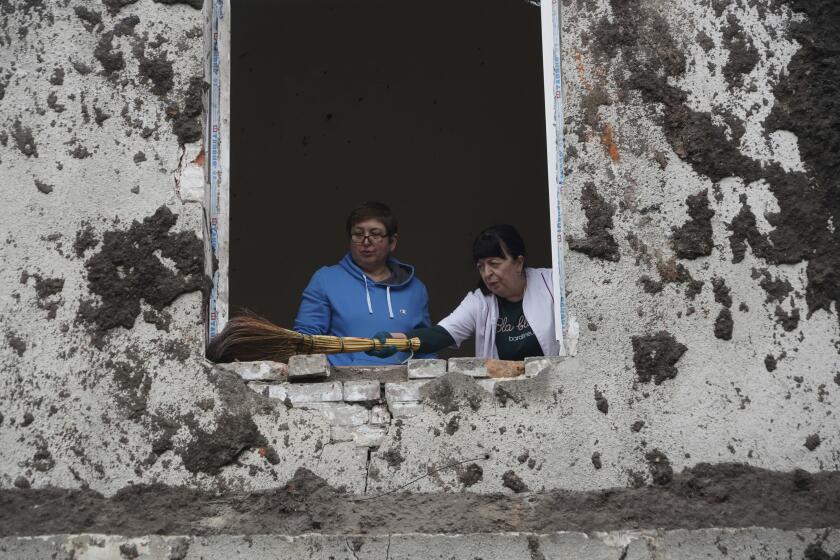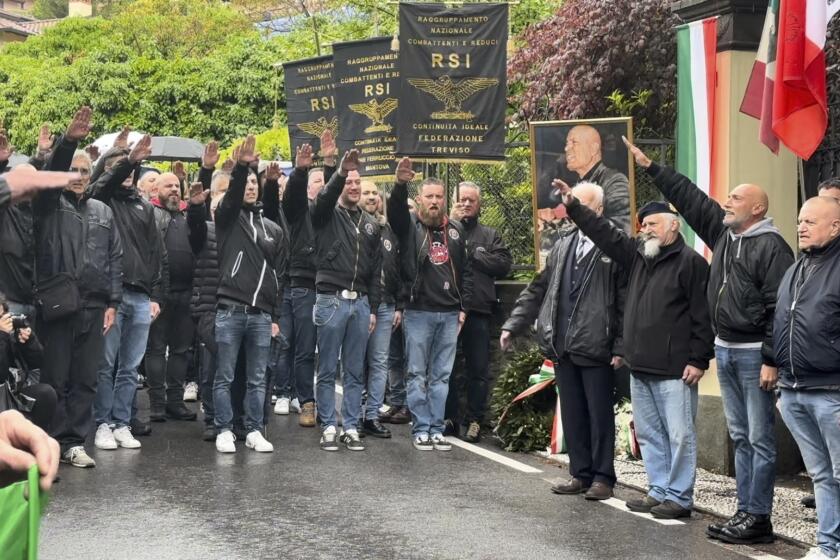Iraq vote turnout fails to meet expectations
Just over half of Iraq’s 15 million registered voters cast ballots in weekend provincial elections, with turnout as low as 40% in at least one province, but Iraqi and international officials insisted Sunday that they were satisfied with the participation.
U.S. Ambassador Ryan Crocker characterized the turnout as “large” and Iraq’s top election official called it “the most important election to take place since the fall” of Saddam Hussein. However, turnout failed to reach the 73% predicted by a recent government poll of 4,570 Iraqis.
Initial vote results are expected this week, but the final tally will not be known for at least two to three more weeks.
For weeks it appeared the nation was in the grip of campaign fever. Streets were turned into a collage of campaign posters, cellphones were bombarded by campaign text messages and candidates prowled neighborhoods, some handing out gifts.
However, confusion over new and more stringent voter registration practices prevented some Iraqis from voting. Others said that lavish campaign spending and past performance of politicians drove them to avoid the polls.
“I don’t trust any one of the candidates,” said Usam Mohammed Hassan, a 27-year-old Baghdad resident who chose not to vote. “I consider them as a group of thieves coming to get financial benefits for themselves and their political parties as Iraq is going to witness a campaign of reconstructions.”
Iraqi Prime Minister Nouri Maliki had urged Iraqis on Jan. 23 to vote and said he hoped for a turnout of 70% or 80%.
Members of Iraq’s Independent High Electoral Commission said Sunday that they were pleased with the results.
“Fifty-one percent is high turnout indeed for provincial elections,” said Qasim Hasan Abodi, a judge and the chief officer of the commission. “Very rarely in other parts of the world do you get such a high percentage in provincial elections.”
Saturday’s turnout was less than in the last provincial elections, in 2005, when 58% of voters participated in balloting that also included the selection of national lawmakers. The elections four years ago were carried out under a greater threat of violence and marked by a widespread boycott among Sunni voters. Only 2% of voters in Sunni-dominated Anbar province turned out then; 40% went to the polls Saturday.
This weekend’s relatively low turnout was likely to help ruling parties, said Joost Hiltermann, a political expert with the International Crisis Group.
“The ruling parties will benefit from low turnout as it means that voters who were fed up with their poor record of governance decided to stay home rather than oust them from power at the ballot box,” Hiltermann said. “The real question then is, who among the ruling parties will do better?”
Saturday’s election was the first to feature a new registration process similar to that used in the U.S., in which voters register in advance and are assigned a specific polling location. In past elections, Iraqis could choose among a number of polling stations to vote. The new regulations were designed to combat fraud.
The restriction, however, resulted in many Iraqis being turned away from polling stations because they were not registered there. In some cases, voters visited a number of stations searching registration lists for their names.
“Since early morning I am looking for the names of my family,” Yahya abu Ahmed, 35, of Fallouja complained Saturday. “We are four persons. . . . We haven’t found our names yet. . . . I think this is one of the mistakes intentionally done so that the influential parties will use our votes.”
On Sunday, election officials said the number of voters turned away at the polls amounted to less than 1% of the total turnout and was statistically insignificant. They blamed voters for failing to heed instructions or to find out where their polling stations were before the elections.
“It was negligence on their part,” the electoral commission’s Abodi said. “They just showed up, as was the habit of past elections, at the nearest polling center to their house.”
The registration problem hit internally displaced Iraqis the hardest, however. In an effort to make it possible for the displaced to vote, a number of polling stations were opened specifically for them.
Saturday’s polling was also notable for the lack of significant violence, a major indication of progress.
In polling stations throughout Baghdad, voters felt secure enough to bring their children with them and treated the event like a holiday outing.
Polling officials also insisted that the election was one of the cleanest in Iraq’s history, although it was not without allegations of impropriety.
“There are no elections without complaints and no elections without violations,” Abodi said.
He said that the electoral commission was well equipped to deal with the violation complaints and that they had been broken down into three categories: red, yellow and green, with red being the most serious allegations.
“I can tell you in all honesty,” he said, “the number of red complaints was far, far lower than expected.”
--
Times staff writer Raheem Salman contributed to this report.
More to Read
Start your day right
Sign up for Essential California for news, features and recommendations from the L.A. Times and beyond in your inbox six days a week.
You may occasionally receive promotional content from the Los Angeles Times.







